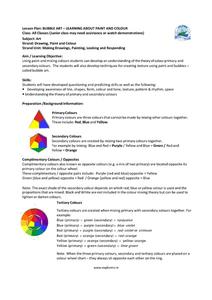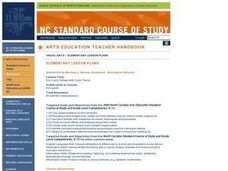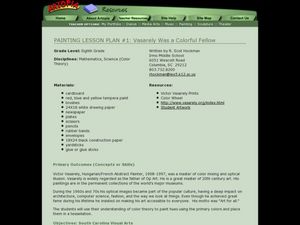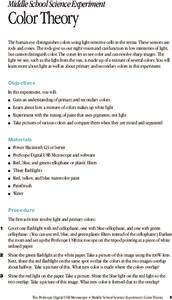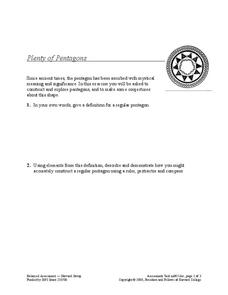Curated OER
Color Theory & Using Layers
Students investigate the color wheel theory and incorporate it into simple sketches on their handheld. The importance of the use of layering and the difference between primary, secondary, and tertiary colors is presented in this lesson.
Curated OER
Painting a Color Wheel
You have to love the color wheel, it's just so colorful! Your kids will love it too, as they work through an introductory exercise which allows them the opportunity to draw and paint a color wheel of their own. This wheel focuses on...
Marine Institute
Bubble Art – Learning About Paint and Color
To gain an understanding of color mixing theory and the color wheel, young artists draw a picture, mix up a batch of secondary colors to which they add dish soap, and using straws, bubble up the paint....
Curated OER
Eric Carle Collage with Color Theory
Second graders analyze color theory and collage techniques through the creation of collages in the style of artist/author Eric Carle. Color experiments and may hands-on section allow this lesson to be very informative and fun for the...
Sargent Art
Warhol-like Color Study
The lithographs of pop artist Andy Warhol inspire a lesson that asks young artists to try their hand at creating a study that demonstrates the effect color has on design. After drawing a self-portrait, participants paint their image in...
Curated OER
Vasarely Was A Colorful Fellow
Eighth graders create artwork inspired by the work of Victor Vasarely. In this op art lesson, 8th graders explore color theory and color mixing. Students create ten shapes to use in their artwork and over the course of two weeks,...
Curated OER
2-Dimensional Shapes: Coloring Shapes
For beginners to color, number, and shape theory, this is a great way to solidify skills. They use a key at the top to determine which color (yellow, green, purple, or blue) to shade each shape (square, triangle, circle, and rectangle,...
Curated OER
The Element of Color
Eighth graders study and analyze the elements of color by creating an personalized color wheel. Emphasis is placed on constructive criticism of student work by others for assessment. Students create short poems for their color wheel...
Curated OER
Color Theory and Acrylic Painting
Pupils study color, acrylic painting and abstract art.
Curated OER
Color Mix Up
In this art worksheet, learners use the template of shapes and paint the colors as directed with water colors. Students allow the paints to dry before applying the second overlapping color. This worksheet is geared to the adults who will...
Curated OER
Coloring Fabrics With Dyes from Plant Materials K-12 Experiments & Background Information
Students investigate the effects of acid and bases on dyes made with plant materials. In this chromatography lesson students predict color outcomes and complete a lab activity on color combinations.
Curated OER
Introductory Activity for Color Unit: Edible Color Wheel
Students use food coloring and frosting to make an edible color wheel. They identify the primary colors and experiment with mixing colored frosting to produce the secondary colors. Students then eat their color wheel.
Curated OER
Alternate Theory of Color Perception
Students use the color wheel, matches, masking tape, and slides to view an alternate theory of color perception. In this color perception lesson plan, students discuss the different theories and processors.
Curated OER
Creative Color Wheel
In this color theory worksheet, students draw a large circle on a piece of paper and make six shapes evenly spaced around the circle. Students color the wheel according to the directions. This worksheet is geared toward adults who will...
Curated OER
Color Theory
Students are able to gain an understanding of primary and secondary colors. They are able to explore about how a mixture of colors makes up white light. Students are able to experiment with the mixing of paint that uses pigments, not...
Star Wars in the Classroom
"Shakespeare and Star Wars": Lesson Plan Day 12
Class members compare the final 30 minutes of Lucas's Star Wars: A New Hope with Act V of Doescher's play, William Shakespeare's Star Wars: Verily, A New Hope and consider how the choice of media influences viewers' impression...
Balanced Assessment
Plenty of Pentagons
Why are only four colors needed to color webs from regular pentagons, not five? An assessment task requires young mathematicians to first construct regular pentagons using a compass and straightedge, then has them consider a shape...
Curated OER
Color Theory Unit: Tint & Shade Strips
Students create three tint and three shade strips which depict a gradual gradation from color to white and from color to black.
Curated OER
Edible Color Wheels
Students create an edible color wheel using cookies and frosting. They mix tints into frosting to simulate the color of the color wheel.
Curated OER
Four Color Map
Learners explore geometry by completing a color puzzle. In this shape identification lesson, students utilize deductive reasoning to complete a Google SketchUp puzzle with trapezoid, triangles and rectangular shapes. Learners...
Colorado State University
Why Are Clouds White?
Is it possible to change the color of clouds? A three-part activity explores the scattering of light by the water droplets that make up clouds. After observing a demonstration, curious scholars conduct their own investigations of the...
National Gallery of Canada
My Treehouse
If you could build your own treehouse, what would it look like? Using a piece of contemporary art as inspiration, learners draw their own treehouses and add geometric and organic shapes. The lesson touches on Visual Thinking Strategies...
Curated OER
The Art and Science of Impressionist Color
Discover Impressionist painting as learners investigate the 19th century combinations of colors characteristically used. Students experiment with their own paintings, utilizing primary and secondary colors.
Fun Music Company
Relative Major and Minor
It's all relative. Young music theorists are asked to count to three and identify the relative major and minor keys of keys that share the same signature.




